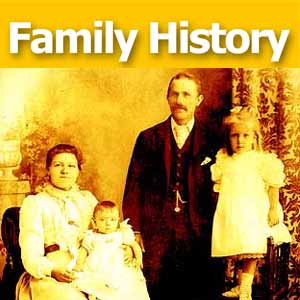Blog


Family History Episode 38 – How to Start a Genealogy Blog, Part 1
 Family History: Genealogy Made Easy
Family History: Genealogy Made Easy
with Lisa Louise Cooke
Republished July 1, 2014
[display_podcast]
Download the Show Notes for this Episode Welcome to this step-by-step series for beginning genealogists—and more experienced ones who want to brush up or learn something new. I first ran this series in 2008-09. So many people have asked about it, I’m bringing it back in weekly segments.
Episode 38: How to Start a Genealogy Blog, Part 1
Have you ever thought about starting your own genealogy blog? Or, if you have, have you wished you could get some expert tips on making it better? In these next few episodes, we’re going to talk about sharing your research and/or your thoughts on the research process by blogging. But even if you don’t plan on starting a blog anytime soon, I know you will enjoy the seasoned genealogy blogger I’ve invited to start us off. The Footnote Maven’s passion for genealogy is contagious, and you’ll enjoy her sense of humor, and words of wisdom.
I caught up with the Footnote Maven at the Southern California Genealogy Jamboree. She has been blogging for quite some time now and has much to share on the subject. Her two very popular blogs, FootnoteMaven and Shades of the Departed, are widely read by genealogists everywhere.
In this episode, she shares:
- specific tips for getting started, how she prepares her blog posts
- what she would have done differently if she could start all over again
- 9 tips for getting readers to leave comments.
But first, a Mailbox Moment:
A reader writes in to comment on Episode #36 and questions regarding Family Tree Maker and Ancestry.com. He sends this link, which shows how to use both websites to search for a female who has married. As you suggested, entering the Birth Name in the database, but how to locate that person using Family Tree Maker’s Web Search feature at Ancestry.com. This specific example is for a census record, but other records can also be found using this same technique.
Family History Blogging with the Footnote Maven
According to her website, a “footnote maven” is someone who is dazzlingly skilled at inserting a citation denoting a source, a note of reference, or a comment at the foot of a scholarly writing.
Footnote Maven’s thoughts on getting started with your own genealogy blog: Go look at several genealogy blogs. What do you like? What do not like? Design wise and content wise. Ask yourself what kind of blog you want to write. Who is your audience? What will you offer them?
Biggest piece of advice: You don’t want to be someone else – be yourself! Everybody else is already taken! “There is something wonderful in all of us – we just have to determine what that is and showcase it.” Pick your niche and stay there. And love doing it, because you’ll never get rich at it! She says, “It is the breath I take…It’s the reason I get up in the morning.”
What She Would Do Differently If She Could Have:
- 25 posts in draft ready to go allowing more editing time
- I would tinker more with the look of my blog until it was the way I wanted
- Invite a few friends to test drive it
And she’ll tell you what was even harder for her than starting her first blog!
Now that the genealogy blogging community is established, people don’t comment as frequently. Footnote Maven shares these for getting comments on your blog:
- Thank people for the comments they leave on your blog
- Go to their blog and read it
- Tell the blogger the positive points in what they are doing
- Host a “Carnival” on your blog
- Post “off the wall” stuff once in a while
- Have good, creative titles for your posts – something that’s going to spark the interest
- Use a word in your title that folks haven’t heard before to catch attention
- Tag your posts and images
- Include “keywords” such as “genealogy.”

One of the Easiest or Most Complicated Genealogies in the World?

Easy or complicated genealogy for the folks on this remote island? Tristan da Cunha, Wikipedia image.
Small, isolated populations should mean it’s easy to do their genealogy, right? Well, I wonder.
I came across this Wikipedia article on Tristan da Cunha, described as “the most remote inhabited island in the world, lying 1,750 miles from the nearest landfall in South Africa, and 2,088 miles from South America. Its current population of 264 is thought to have descended from 15 ancestors, 8 males and 7 females, who arrived on the island at various times between 1816 and 1908. The male founders originated from Scotland, England, the Netherlands, United States and Italy and the island’s 80 families share just eight surnames: Glass, Green, Hagan, Lavarello, Patterson, Repetto, Rogers, and Swain.”
Of course, success in doing family history on this island depends a lot on how strong their record-keeping and preservation has been. (Consider what one natural disaster could do to written history) Barriers to migration should certainly mean it’s easy to find ancestors. But what does that family tree look like? How many people will show up in multiple places on the tree?
Have you ever done genealogy research on an isolated or insular group? What are the challenges? What’s easier? Feel free to share on the Genealogy Gems Facebook page. Feel free to share your tales of complicated genealogy!

FGI 2015: Forensic Genealogy Conference in Dallas, Texas
The fourth annual Forensic Genealogy Institute (FGI) will be held March 26-28, 2015, at the Wyndham Love Field Hotel in Dallas, Texas. Two concurrent, 20-hour  courses will debut: “Forensic Genealogy Master Practicum” and “Advanced Genetic Genealogy and Unknown-Parentage Cases.”
courses will debut: “Forensic Genealogy Master Practicum” and “Advanced Genetic Genealogy and Unknown-Parentage Cases.”
“FGI offers attendees one-of-a-kind education in forensic genealogy and access to expert forensic genealogists who can answer questions and act as mentors,” said Leslie Brinkley Lawson, CAFG President. “We are excited to offer FGI 2015 participants the opportunity to participate in an unprecedented forensic-genealogy practicum or to gain experience in cutting-edge genetic genealogical research.”
The genetic genealogy course sounds especially fascinating. The course description includes how-tos on developing custom DNA-testing plans, analyzing genetic test results and integrating traditional genealogical research with DNA test results to address research questions.
“Genealogists who can use DNA to successfully address unknown-parentage cases are in great demand,” says course coordinator CeCe Moore. “This unique course offers in-depth instruction of the methodologies used by professional genetic genealogists.”
Each FGI 2015 course offers 20 hours of instruction over just three days, minimizing hotel costs and time away from families and jobs. The learning opportunities presented at FGI are created specifically for professional, practicing genealogists who specialize or seek to specialize in forensic genealogy.
Registration for the 2015 Forensic Genealogy conference will open in summer 2014.





